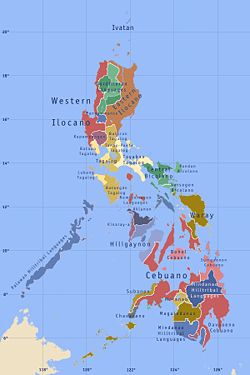Wiki Society of the Philippines/Projects/Phil Wiki Expansion
| This page is currently a draft. More information pertaining to this page may be available on the talk page. |
- Legal name of chapter
- Wikimedia Philippines Inc.
- Grant contact name
- Roel Balingit
- Grant contact user-name or e-mail
- Scorpion prinz / roel.balingit@wikimedia.org.ph
- Grant contact title (position)
- Treasurer
- Project lead name
- Roel Balingit
- Project lead user-name or e-mail
- Scorpion prinz / roel.balingit@wikimedia.org.ph
- Project lead title (position), if any
- Project coordinator
- Full project name
- Philippine Wikipedias Expansion Project
- Amount requested (in USD)
- Provisional target start date
- Q3 of 2011
- Provisional completion date
- Q2 of 2014
Activities
[edit]Budget breakdown
[edit]Category Allocation in PHP Amount in USD
($1.00=₱43.37)Total
Project scope
[edit]
The Philippines is the 12th most populous country in the world with over 94 million people and has over 170 languages, of which twelve are recognized to be of regional importance namely Tagalog (21.5 million speakers), Cebuano (15.8 million), Ilokano (6.9 million), Hiligaynon (5.8 million), Central Bikol (4.6 million), Waray-Waray (2.6 million), Kapampangan (1.9 million), Pangasinan (1.2 million), Kinaray-a (855,000), Tausug (817,000), Maranao (778,000) and Maguindanaon (759,000), not counting the generic national lingua franca — Filipino. Despite these numbers, there are only eight Philippine language Wikipedias (number of articles in parenthesis as of June 30, 2011) namely: Tagalog (51,896), Waray-Waray (101,722), Cebuano (42,723), Kapampangan (7,566), Central Bicolano (5,138), Pangasinan (3,489), Ilokano (2,866) and Chavacano (2,451).
Though internet penetration in the Philippines remains relatively low at 29.7 percent of the population, this figure already translates to roughly 28 million internet users. A huge chunk of this figure however accesses the internet only through internet cafés which are utilized more often for online gaming and social networking site interactions, as evidenced of the Philippines having the 7th largest Facebook users in the world.
| Tier | Language |
|---|---|
| Tier 1 | Tagalog |
| Cebuano | |
| Tier 2 | Ilokano |
| Hiligaynon | |
| Central Bikol | |
| Waray-Waray | |
| Kapampangan | |
| Pangasinan | |
| Tier 3 | Kinaray-a |
| Maranao | |
| Tausug | |
| Maguindanao | |
| Tier 4 | Chavacano |
Majority of universities and their libraries on the other hand, especially in the countryside (which is the heartland of all other regional languages, except Tagalog) leaves so much to be desired, hence penetration of Wikipedia and its other sister projects is hardly felt. These universities would gladly welcome any form of assistance that can be extended to them, in exchange they would have to enjoin their students to write for Wikipedia in their native language. And when enough training and exposure has been given to them, Wikipedia writing competitions could then be held as a testament to its acceptability within the bounds of an academic setting.
Recently there have been movements and associations (i.e. Akademyang Bisaya, Pangasinan Writers Association) aiming to revive regional languages to stave off the onslaught of the Manila-based mass media which uses Filipino and English as their medium. The diaspora of university students to Tagalog-dominated Manila, if not to study but also work after graduation causes another setback in the propagation of their languages. This is an opportune time to ride on this bandwagon and work hand-in-hand with these organizations by teaching them the rudiments of Wikipedia and showing to them that it is an available platform for the propagation of their languages.
The project is intended to run for a period of three years, and will initially tap universities with language centers such as, but not limited to:
- University of San Carlos' Cebuano Studies Center in Cebu City
- Holy Angel University's Center for Kapampangan Studies in Angeles City
- Mariano Marcos State University's Center for Ilocano-Amianan Studies in Batac City, Ilocos Norte.
In the foresight results of this project can also be published under a Creative Commons Attribution-ShareAlike (CC-by-SA) 3.0 license.
Project goal
[edit]The goal of the project is to significantly increase the number of articles in the eight existing Philippine language Wikipedias namely Tagalog, Cebuano, Ilokano, Central Bicolano,Waray-Waray, Kapampangan, Pangasinan and Chavacano. It aims to bring Wikipedia and its other sister projects to the heartland of these languages by actively promoting them in schools and communities — through partnerships with universities and centers of their language studies and to some extent government agencies by sponsoring Wikipedia writing competitions in their respective languages, providing them equipment and materials which can also be used to promote Wikimedia projects. These will be geared to entice membership and active participation not only to the organization but also to the Wikimedia projects.
It also aims to create full-fledged Wikipedias in other major regional Philippine languages namely Hiligaynon, Maranao, Tausug and Kinaray-a, as well as other Philippine languages already in the Incubator stage, and even those that are yet to be proposed, notably Maguindanaon.
Other benefits
[edit]This project will also create awareness and enliven consciousness in their respective communities on the need to keep their respective regional languages alive by using Wikimedia's readily available platforms. By setting up partnerships with language associations, regional language institutes or universities which offer regional ethno-linguistic studies, it can serve as the grass-roots training ground for prospective Wikimedia contributors and exposing them early on into enriching their language, as well as encouraging campus-based Wikimedia/Wikipedia organizations which can contribute to the growth of Wikimedia in the Philippines.
Non-financial requirements
[edit]Wikipedia learning materials and merchandise.
Measures of success
[edit]This project can be assessed successful if after the three-year period it aims to initially run, it will be able to increase by at least 30 percent (based on June 30, 2010 statistics), the Tagalog, Waray-Waray, Cebuano Wikipedias; double the number of articles of the Kapampangan, Central Bicolano, Pangasinan, Ilokano and Chavacano Wikipedias. Create three other Philippine language Wikipedias with at least 3,000 articles.
